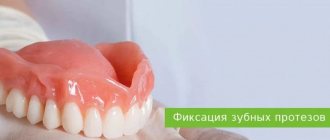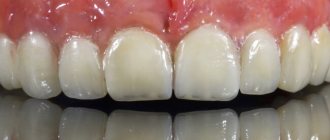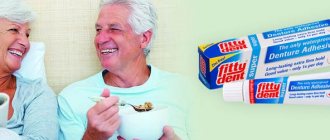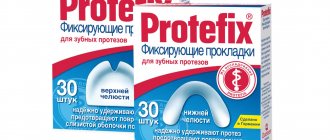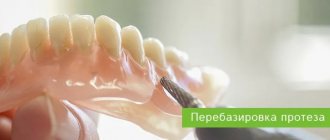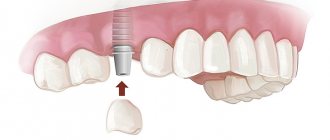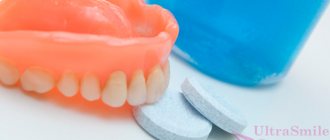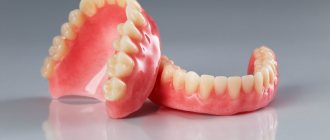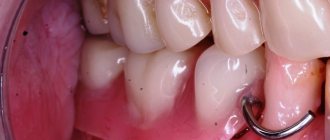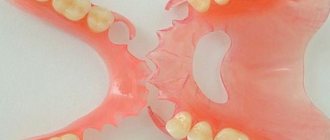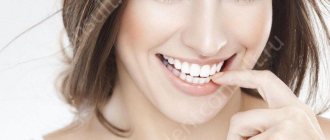One of the main problems that people with removable dentures face is insufficiently secure fixation. Despite careful individual selection, the structure can move while chewing food, talking, or laughing. This occurs due to insufficient adherence of the inner surface of the denture to the gum.
The solution to the problem is the use of special fixing substances. Today, the range of these products is widely represented in the windows of pharmacies and supermarkets. The products are produced in the form of a cream or gel.
Television advertising promises an immediate and long-lasting effect, but the consumer has a lot of questions: what to choose and should you believe the advertising?
Purpose of glue in prosthetics
Creams and adhesives in dentistry are used both for fixing dentures and as auxiliary materials in combination with other fasteners to ensure optimal strength and stability of the structure.
Suitable for attaching removable dentures made of plastic, nylon and other materials. Apply in the following cases:
- regular fixation of removable structures;
- temporary fixation of fixed prostheses when they break for the period of replacement;
- fixation of the crown when the cement underneath is destroyed;
- ensuring a tighter fit of the crowns and preventing chafing of the gums.
The adhesive is selected based on the duration of fixation, consistency, the presence or absence of flavorings in the composition, the individual characteristics of the oral cavity and the type of prosthetic structures.
Features and Benefits
Most patients claim that at the beginning of using the prostheses they held well, but after some time the fastening became unreliable. Why is this happening? The fact is that over time, bone tissue atrophy gradually occurs. For this reason, there is no vacuum effect between the sky and the artificial material. To correct this point, experts recommend using additional fixatives, such as cream or gel. Finding them is not difficult; they are sold in almost every pharmacy or dental centers.
Such means have some advantages:
- Promote a more uniform load on the mucous membrane.
- Can be used for removable dentures made of absolutely any material.
- Most products are hypoallergenic.
- Eliminating the fear that the structure might fall out of your mouth.
- Prevents chafing.
- Speed up the adaptation process.
- Ensures a strong hold.
Fixing cream "Protefix"
A German-made product with a dense consistency and easy application. It has a number of important advantages:
- ease of application due to high viscosity;
- absence of harmful chemical components, dyes and fragrances in the composition;
- does not change the taste of food and drinks;
- economical use of funds;
- guaranteed stable fixation for 12 hours;
- immunity to salivation;
- fast adhesion time - it only takes 5 minutes to secure the prosthesis in the mouth;
- antiseptic effect.
The drug has almost no contraindications and can be used for both permanent removable systems and temporary ones.
Criterias of choice
It's hard to say which cream is the best. If you are prone to allergic reactions, we recommend choosing transparent gels without fragrances or dyes. Creams and gels are almost identical in effect, but the first option has a thicker consistency. Let's look at some more useful tips:
- Choose a large-volume tube, it is much more profitable.
- Give preference to products with long-lasting fixation.
- Read the ingredients, do not take creams with a lot of chemical components.
- The price is not so important, but the manufacturer is worth paying attention to. You should not buy little-known products of questionable quality.
If you are in doubt and cannot make a choice, contact a specialist. Depending on the wishes and characteristics of the body, the dentist will advise the best option.
Cream "Korega"
Products from an Irish manufacturer. Provides convenience and comfort throughout the entire period of use, effectively prevents displacement of the prosthesis and allows you to lead a full life without embarrassment and awkwardness.
The composition has many advantages:
- convenient packaging with dispenser;
- dense consistency, most convenient for application and uniform distribution;
- ensures a tight fit and prevents food from getting under the dentures, thereby counteracting infections and bad breath;
- innovative formula without zinc;
- several release options to choose from, including in the form of a cream with a refreshing effect;
- neutral taste, does not change the taste properties of food;
- guarantee of stable fixation for 12 hours;
- when hardened, it takes on a gum shade that is as close as possible to the natural shade.
Before using the cream, the denture should be thoroughly cleaned; the manufacturer produces cleaning tablets specifically for this purpose.
How to use it correctly
Regardless of consistency, price and manufacturer, most fixing creams are used in an identical way:
- Wash the removable product thoroughly with a soft brush and soapy water, and air dry for a couple of minutes.
- Next we use the cream itself. Almost every instruction shows a visual illustration of where the product needs to be applied.
- Put on the prosthesis in the standard way, carefully pressing it against the mucous membrane for at least one minute.
- Try to eliminate food and even water for half an hour.
- Before removing your orthotic, first rinse your mouth with warm water.
The frequency of use of the cream depends on the duration of fixation. This information can be read on the packaging. Experts do not recommend using this product more than once a day. Otherwise, irritation of the mucous membrane and even allergies may begin.
Cream for fixing dentures “President Garant”
This is an Italian-made product, comes in a standard tube, is easy to apply, fills all gaps and voids, ensuring the tightest possible fit.
Other benefits:
- securely fixes structures for up to 36 hours - an ideal solution for trips, business trips and lengthy events;
- Available in two types: neutral and mint flavor;
- protects soft tissues from chafing;
- the presence of natural plant extracts in the composition;
- compatible with any prosthetic structures;
- no side effects;
- simple and quick installation.
President Garant fixation cream is not destroyed by any food or drink, which ensures guaranteed fixation of the denture
Most popular creams have similar composition and qualities. However, when choosing an adhesive, you should be guided by the dentist's recommendations, this guarantees strong fixation and safe use, taking into account the individual characteristics of the patient.
Why use Corega to clean dentures?
The beauty of the dentition, freshness and constant cleanliness of the oral cavity will help you feel confident in the process of communicating with people, eating food and drinks. To maintain a feeling of freshness for a long time, you must carefully monitor your oral hygiene and keep your dentures clean.
Standard tooth brushing paste is not suitable for such tasks: dentures are several times softer than natural teeth. Therefore, it is necessary to find a product whose structure will not damage the surface of dentures. Corega products for cleaning dentures have a special composition that removes unpleasant odors, plaque and bacteria. The manufacturer offers a line of cleaning products:
- Tablets with a biocompatible formula that are used to clean dentures;
- A product for daily care of dentures with a whitening effect.
There are practically no contraindications for the tablets: the product can be safely used during pregnancy and diabetes. The main indications and purposes of tablets for cleaning removable dentures are:
- Creation of a liquid for everyday cleaning of dentures;
- Destruction of plaque and dirt from teeth;
- Prevention of the development of inflammatory diseases in the mouth;
- Maintains a pleasant smell and a feeling of cleanliness in the mouth.
Tablets "Korega" for cleaning dentures bio formula
In order for the product to bring maximum benefit, before using Corega tablets for cleaning dentures, the instructions must be read. The drug with a bioformula is intended for everyday hygiene of removable teeth, because it removes plaque, stains, maintains freshness and gives an attractive appearance to the dentition.
Corega preparations reduce the number of bacteria by 99% in a few minutes, and also allow you to avoid soaking the structure overnight in liquids with an unpleasant odor. To obtain benefits, you must strictly follow the instructions from the factory instructions:
- The capsule must be placed in a container with warm water so that the resulting solution completely covers the entire prosthesis.
- The structure should be left for at least 3 minutes;
- Next, you should clean the denture using a soft toothbrush with the resulting liquid;
- After cleaning, it is necessary to rinse the structure in water.
The solution that remains after cleaning the structure should not be reused or stored. Customer reviews regarding Corega tablets are positive, but customers recommend choosing a liquid based on individual characteristics, taste preferences and financial capabilities. The price of "Korega" for the hygiene of dentures with a biocompatible formula can vary from 150 to 200 rubles.
Preparing for the study
Laboratory testing uses the patient's venous blood for analysis. To increase the reliability of the result, it is recommended:
- take blood samples in the morning from 8:00 to 10:00;
- submit material for research on an empty stomach;
- on the eve of the study, reduce physical, sports and emotional stress, eliminate smoking and alcohol.
It is allowed to drink a small amount of clean drinking water without gas.
Materials and methods
In order to scientifically substantiate the effectiveness of using this tool to improve the fixation of removable plate dentures of the full dentition, a series of studies were conducted to study its physical and mechanical properties [8] on the basis of the technical laboratories of the dental departments of the State Budgetary Educational Institution of Higher Professional Education “VSMU named after. N.N. Burdenko" and the dental materials production company Celit LLC (Voronezh).
Determination of the adhesive strength of the core material to the base and mucous membrane was carried out according to the method developed by I.Ya. Poyurovskaya, T.F. Sutugina, N.N. Urazaeva (1986). Especially for the experiment, sections of the pig intestinal mucosa were pre-frozen and cut out in the shape of a triangle measuring 7x7x7 cm. The adhesive composition was placed on a triangular plate made of Ftorax base plastic of the same dimensions as the prepared mucosal sample, and the material was evenly distributed over the surface. After this, it was covered on top with a triangular sample of the mucous membrane, previously moistened with water. For a tighter and more uniform fit, the entire structure was pressed with a load weighing 1 kg for 5 minutes. Next, the base plate with the coreg adhesive material and the mucous membrane was fixed in a stand so that the base of the triangle was parallel to the plane of the table. At the apex of the triangle, about 5 mm of the mucous membrane was peeled off and, having punctured it, a load weighing starting from 2 g was suspended, and a stopwatch was immediately started. After 60 s, the load was removed and the length (L) of the line at which peeling stopped was measured.
The adhesion force of the material to the substrate (P), balancing the load used, divided by the length of the line, characterizes the adhesive strength (A) of the material, which was calculated using the formula:
(g/cm)
Exactly the same experiment was carried out taking into account the influence of a humid environment, that is, after keeping the sample in water under a load for 1 hour. All tests were carried out in four parallels. The arithmetic mean of parallel tests was taken as the result.
The adhesive strength of the core composition to a base plastic plate was also determined using an IR 5040 tensile testing machine. To test the adhesive peel strength of the core composition to a metal disk with a diameter of 100 mm, a triangular-shaped substrate made of base plastic with sides of 43 mm was rigidly glued to a metal disk with a diameter of 100 mm using super glue. Next, a 0.5 g sample of the test material was applied on top of the dry surface of the base plastic and covered with a metal ring with an elastic film with a diameter of 100 mm. Then the sample was placed in a thermostat at 37C° (relative humidity 80%), a load of 5 kg was applied, and the holding time was 5 minutes. After this, the load was removed and the sample was removed from the thermostat. A metal ring with a rigid base was secured in a fixed clamp of an IR 5040 tensile testing machine, and a metal ring with an elastic film in a movable clamp using a metal fishing line. The tensile testing machine was turned on and a pull-out test was performed in such a way that the pull-out force acted perpendicular to the contact surface. The adhesive strength was calculated using the formula:
where Q is the value of adhesive strength; F—maximum load; S is the surface area at which deformation occurred.
The sample with the adhesive composition was subjected to 5 tests.
The determination of the time of fixation of the coreg adhesive material was carried out directly in the oral cavity of 18 patients with complete absence of teeth and with varying complexity of anatomical and topographic conditions of the prosthetic bed after 1 and 12 months of using well-fitted complete removable laminar dentures with an adhesive composition. To do this, all patients cleaned the oral cavity and dentures, after which the test adhesive composition was applied to the inner surface of the denture bases in an even thin layer. The dentures were inserted into the patients' oral cavity and pressed tightly against the gum mucosa for 30 s. Then the subjects were asked to open their mouths for 30 seconds by an average value of 20-25 mm, which corresponds to the distance between the cutting edges of the central incisors when biting off food. If during this time the prostheses did not move in relation to the prosthetic bed, then such fixation was assessed as sufficient. Every 30 minutes the patient underwent the above-described test. After an hour and a half of using the prosthesis, food was allowed (warm tea, gingerbread weighing 50 g). The experiment ended as soon as the time for fixing the prosthesis with the mouth open was reduced to 10 s.
Also, these patients underwent an objective examination and subjective data were assessed in order to determine the degree of fixation of removable dentures to the prosthetic bed with and without the use of coreg adhesive material, using the Ulitovsky-Leontiev prosthesis fixation index (DF), immediately after manufacture, as well as after 1 , 3, 6 months and a year of their use. For each patient, numerical index criteria were determined, which were assessed in parameters using a 5-point system (Table 1).
Table 1. Parameters of the fixation index of the Ulitovsky-Leontiev prosthesis
After this, this index was calculated using the formula:
Ulitovsky-Leontiev FP index (%) =
E (a1+…+ ap)
100.5n
where E is the sum of quantitative assessments of the criteria; а1 — number of points according to the first criterion; an — number of points according to the nth criterion; n is the number of criteria used in the index; 5—number of parameters to be evaluated within each criterion.
The evaluation of the results of determining the degree of fixation of removable dentures to the prosthetic bed with and without the use of an adhesive composition was carried out in accordance with the data presented in table. 2.
Table 2. Evaluation of the results of determining the Ulitovsky-Leontiev AF index
The obtained data were entered into tables of individual patient observation cards. Next, the indicators of the AF index determined at different times were summed up, after which a comparative assessment of the dynamics of the average indicator of the fixation index in the group was given.
Rules of application
Corega cream for fixing dentures allows you to obtain maximum adhesion only if you follow the following instructions:
- Apply the product only to a previously clean and dry structure. For cleaning, you can use Corega tablets.
- The cream is distributed pointwise using a dispenser into the recess of the structure, 1 time per day.
- Before installing the denture, rinse your mouth with water.
- Press your jaws tightly for a couple of seconds after the product has been inserted into the oral cavity.
- Remove any remaining product using a cloth previously treated with oil.
- After use, close the tube of cream tightly.
- Do not wash or handle the tube lid with wet hands.
- Store this product unopened, and when the expiration date expires, the product is no longer suitable for use.
Laboratory diagnostics before vaccination against COVID-19
Immunoglobulin tests are a mandatory examination before vaccination in the presence of drug allergies. The study, as prescribed by a doctor or at your own request, is carried out at the AMC-Medionika clinic in Moscow and is the key to a successful outcome of subsequent immunization. The clinic guarantees:
- reliability of the result;
- speed of obtaining indicators;
- no queues;
- affordable prices for research.
If you wish, you can get advice from an experienced specialist on deciphering the received data. You will be received by highly qualified specialists with many years of experience.
Check your immune status before vaccination to eliminate any risks after vaccination against coronavirus, and make an informed decision about the advisability of vaccination at this stage.
Immunoglobulin tests if you have allergies
The working units of our immune system are specific protein antibodies, immunoglobulins. They are the first to react to the penetration of foreign biomaterials or allergens into the body. All antibodies are divided into 5 classes.
Immunoglobulin E (IgE) is an important parameter of the humoral immunity, produced by the submucosal layer of body tissue in response to exposure to allergens. He is responsible for the immediate manifestation of an allergic reaction. Additionally, it is involved in the creation of anthelmintic immune defense. Accordingly, an increase or decrease in the level of immunoglobulin E in the blood indicates either an allergic reaction or helminthiasis.
An IgE test is prescribed if:
- bronchial asthma;
- rhinitis of allergic origin;
- atopic dermatitis;
- allergies to food or medications.
The first stage of diagnosis involves searching for a group of allergens that causes sensitization to the patient. The second is identifying individual allergens. An increase in IgE reaction signals the need to avoid contact with the substance, as well as with the product containing it.
Phadia AB is a recognized world leader in the development of in vitro diagnostic systems for allergic and autoimmune diseases. Today, the accurate and stable ImmunoCAP®️ technology is the “gold standard” for allergy diagnostics.

